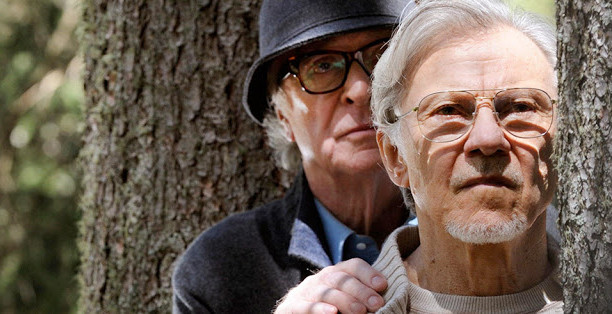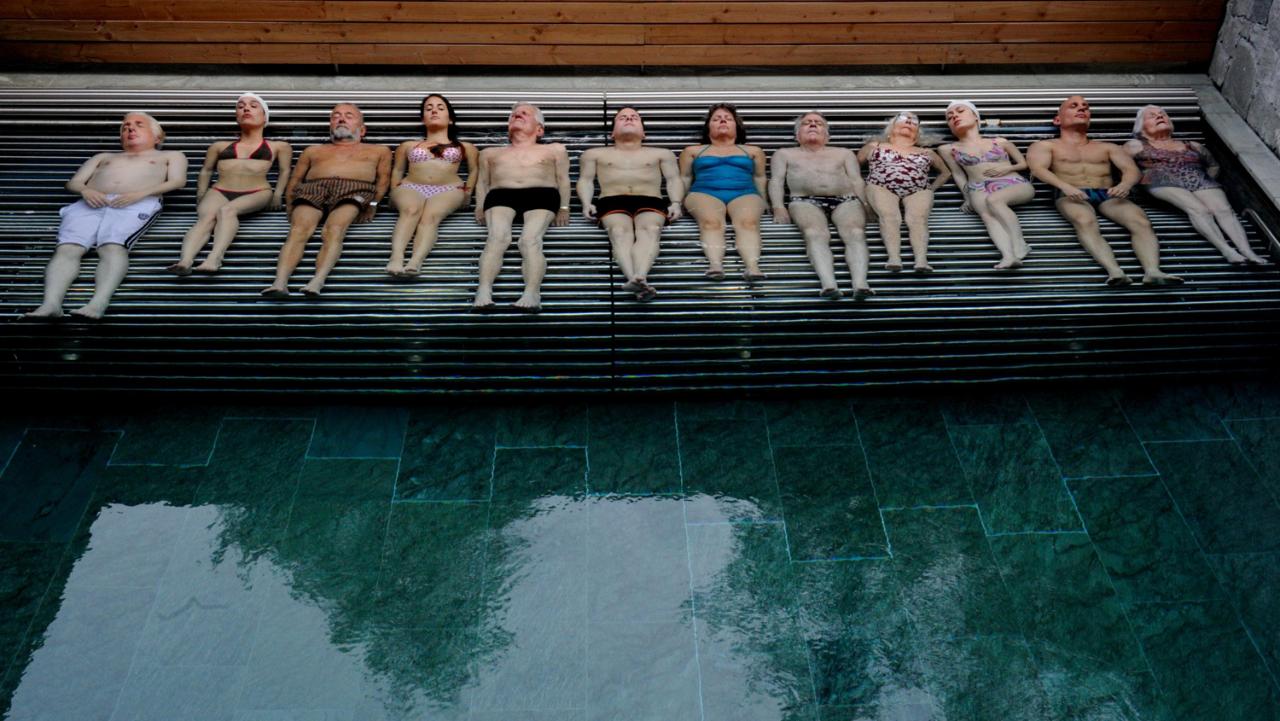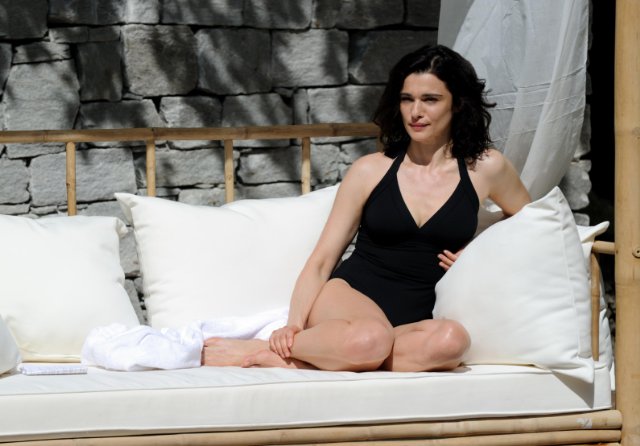
Youth begins with a dance. A cover band on a rotating platform playing the song “You Got the Love.” The singer croons:
Sometimes I feel like throwing my hands up in the air
I know I can count on you
Sometimes I feel like saying “Lord I just don’t care”
But you’ve got the love I need to see me through
This is our human existence. Exhausting. Frustrating. Trying. Overwhelming. Sometimes it all seems too much. Yet we persist, and keep living. Why is that? What is it that drives us? Most people would give one of a few answers, such as love or passion. These are the two themes that pervade the film, mostly delivered through metaphor.
The film is a mishmash of ideas and truths, longings, and aching. Melancholy is an apt word to describe it. Fred Ballinger (Michael Caine) and Mick Boyle (Harvey Keitel) are old friends, having grown up together long ago. They are both currently staying at a Chateau in the Swiss Alps. Ballinger, a composer and conductor, is relaxing and working on his health, while Boyle, a famous director, is working on his next script with a team of young writers. Ballinger’s daughter Lena (Rachel Weisz), who works as her father’s assistant, is also staying with them. Lena is about to take off on a vacation with her husband, only to find that her husband has left her for another woman. This brings up memories of affairs had by her father.
There is not one philosophical idea or question that the film centers around. It functions piecemeal, in random chaotic bits of metaphor and dialogue which function, significantly, like our lives. Our lives never play out just like a movie. There is much more banality in between the moments of significance.
Throughout the film there are two characters who act as symbols. One is the recently crowned Miss Universe, who is awarded a week at the Chateau for her win; the other is Diego Maradona, the soccer star. Miss Universe is young and beautiful, in the prime of her youth while Maradona is nearing the end of his life, overweight, and dependent on an oxygen tank and his wife.
We see Maradona in situations where his age is emphasized. He is swimming in the pool when he gets worn out, and needs help getting to the edge for his oxygen tank. He juggles a tennis ball on the tennis court, just to get worn out after a few kicks, short of breath. This emphasizes the frailty of human beings as we get older. Our bodies break down, and we start to take stock of what we have done, what we’ve accomplished, the relationships we’ve forged, over our lifetime.
Jimmy Tree (Paul Dano) is an actor also staying at the Chateau. He is known for one role that he took many years before, where he played a robot. He is disgruntled about it, always annoyed at how it is the only role people seem to know him from. He tells Ballinger at one point that they are similar, because they are both known for only one thing, among a career of many symphonies and roles. He is taking time to relax, while observing the guests and thinking deeply about his next role, which we learn is Hitler.

In a powerful scene, dressed as Hitler and talking with Ballinger, Tree says, “I have to choose. I have to choose what is really worth telling: horror or desire. And I choose desire. You, each one of you, you open my eyes, you made me see that I should not be wasting my time on the senselessness of horror….I want to tell about your desire, my desire, so pure, so impossible, so immoral but it doesn’t matter because that’s what makes us alive.”
It’s passion that makes us alive. Passion that drives us to do the things we do, whether good or bad. Passion is what makes our life worth living, it is what gives light in the darkness, puts stars in the dark sky, and what makes a novel so vivid that its characters jump off the page or the guitar lines of Jimi Hendrix soar. After Tree says those lines, we see passion play out. We see the monk staying at the Chateau levitate, and Miss Universe join Ballinger and Boyle in the hot tub, nude.
Miss Universe is the core symbol of the film, the metaphor upon which almost the entire rest of the film stands. She is young and beautiful, in the prime of her life, intelligent and driven. She is on a professional high, having just won the Miss Universe contest. She is everything that all of the other characters want to be, and embodies the optimism and energy of having the rest of her life ahead of her while still young. When she gets into the hot tub, Ballinger asks, “Who is she?” Boyle replies, wryly, “God.”
The scene in the hot tub is interrupted when Boyle is told he has a visitor, an actress that he has worked with for decades, Brenda Morel (Jane Fonda). He gets out of the hot tub to go talk with her, and learns that she is dropping out of the movie that he is making. He doesn’t take it well, understandably. This starts a cascade of emotions which culminates in his final scene.
Lena’s subplot is one of the most intriguing aspects of the film. Early on, we find out that her husband is leaving her for another woman. Understandably, Lena gets angry, and spends the rest of the film languishing around the Chateau, simmering under the surface. Her life has just been dismantled; her security taken from her. Early on, her father says, “I find the monarchy so endearing…because it’s so vulnerable. You eliminate one person and all of a sudden, the whole world changes. Like in a marriage.” One person can make a world of difference.

In a scene where she goes to the pool and lays on a couch, a man who works at the Chateau and teaches climbing lessons comes over to her. They converse for a bit, which eventually leads to the climber telling her, “It is an amazing feeling climbing, you know? A real sense of freedom.” Lena responds, “All I feel is fear.” The climber says, “That is an amazing feeling too, you know?”
This is similar to the existential style of thought that I have written about before in this column. When you have real freedom, a plethora of choices, it tends to produce fear and anxiety. Which choice is right? How will you know? What if you make the wrong choice? It is understandable that Lena feels fear when climbing (a metaphor for taking risks when moving forward in life), but the climber’s response is telling.
We tend to believe that fear is a bad thing. Often it is, because it can tell us what we are feeling about a certain situation we may be in, that maybe for our own safety we should leave. We hear that fear is the mind-killer, and again, perhaps in certain situations it is. But the climber’s response suggests that fear can be an exhilarating feeling. In some situations, people like to be scared (why would people watch horror movies otherwise?), but maybe it is just one other peak in the range of human emotions, and we have to remind ourselves how interconnected all of our emotions are. In a later scene where the climber is giving a lesson, he is holding tight to his student, a young girl, and says, “Now as we climb, look down. See how beautiful the world is from up here?” Fear and beauty intermingle, often acting as shadows of each other. How many cliches can you think of that say, in essence, that anything in life worth having is pretty terrifying in the first place? Love is terrifying because it opens us up in all of our vulnerability, but do any of us want to live without love?
Is fear, in and of itself, something that is awful, and should be avoided at all costs? It’s a bit of a cliche to say that it’s impossible to enjoy the good times without also feeling the bad times, but that doesn’t make it untrue. Life is filled with so many emotions, so many different peaks and highs, lows, and dull middle grounds that it wouldn’t be right if it were any different. To know true joy, one must experience despair. The climber is saying here that the point of life is not to only succeed and feel good things, it is not just to eliminate or minimize the hard times (as impossible as that is anyways), but to feel anything at all. Human existence is made significant just by the fact that we feel anything at all, it is what gives our measly little lives value and worth, these passions which bubble and sizzle throughout our bodies while we live.
Boyle is the character who embodies this best throughout the film. While sitting with his writing team, trying to think of ideas for the script, he says, “Most men die not only without a testament, but without anyone even noticing.” One of his underlings responds, “Most men aren’t great artists like you are.” Boyle snaps back, “It doesn’t make a difference! Men, artists, animals…plants! We’re all just extras.” Humans are small. Extras in a film which will never get made anyways. In his final scene, just before jumping out of the window, he tells Ballinger, “You say emotions are overrated, but that’s bullshit. Emotions are all we’ve got.”
Passion. The word in its original Greek was pathos, meaning “suffering,” or “feeling, emotion.” In Latin, it means close to the same thing, with some slight variations depending on which time frame and area of Europe we are talking about. The general notion, however, is “that which must be endured.”
One of the early scenes in the film is Ballinger saying no to a request from the Queen to put on a concert, but he never gives a good reason. In the end, Ballinger finally agrees to conduct for the Queen, where we get to hear the Simple Song that we hear about throughout the film. Ballinger wrote it for his wife, who, despite all of his affairs, was his true passionate love. We find out that the reason he was saying no to the concert in the first place was because it was always meant for his wife to sing. She had long ago lost her singing voice, so Ballinger refused to let another woman sing it. There is no better way to end this article, to summarize the passions and losses, than with the lyrics to the song he wrote, in passion, for the love of his life:
“I feel complete
I lose all control
I lose all control
I respond
I feel chills
I wake
I know all those lonely nights
I know all those lonely nights
I know everything
I lose all control
I get a chill
I know all those lonely nights
I die
I hear all that is left to be heard
I wish you would never stop
I’ve got a feeling
I live there
I live for you now
I leave no sense behind
I feel complete
I’ve got a feeling
I wish you’re moving like rain
I’ll be there, I’ll be there
I lose all control
When you whisper my name
When you whisper my name
When you whisper my name, whisper my name
When you whisper my name”